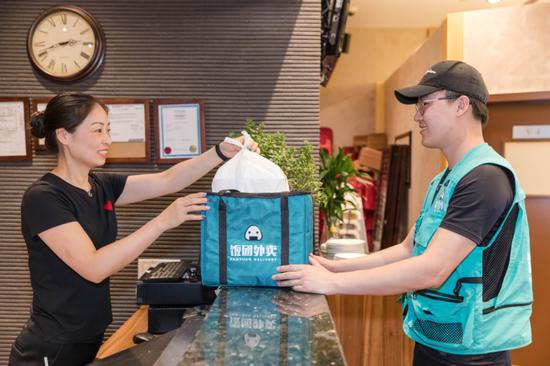
Flourishing Asian Grocery and Delivery Services in AmericaFlourishing Asian Grocery and Delivery Services in America Online grocery stores and delivery services catering to Asian-Americans are experiencing tremendous growth in the United States, transforming the food landscape by bringing rarer dishes from the East within reach in the West. Weee! and Yamibuy: Online Grocery Destinations Weee!, an online grocery store founded in 2015, specializes in delivering fresh food from various Asian cultures to 18 states and dry goods to 48 states. It sources hard-to-find, authentic ingredients for its customers, reaching hundreds of thousands of households. Yamibuy, founded by Alex Zhou, sells an assortment of Asian snacks, particularly those from China. Zhou’s childhood cravings inspired him to create the website, which now caters to East Asian customers as well as people from other cultures. Fantuan: Largest Chinese-Speaking Food Delivery App Fantuan, operating in North America and Australia, is the largest food delivery app targeting Chinese-speaking customers. With over 3.6 million users, it initially focused on restaurant deliveries but has expanded into grocery delivery, offering in-store deals similar to Groupon. Changing Shopping Habits The rise of these services reflects a shift in shopping habits during the pandemic, with more people opting for online purchases and home deliveries. Chinatowns, once the primary destinations for Asian foods, are experiencing a decline in foot traffic due to this trend. Preserving Culture and Satisfying Cravings According to Crystal Li, director of public relations at Fantuan, customers seek the flavors of their hometowns through these services, even when they are far away. They also cater to international students, tourists, and anyone who enjoys authentic Asian cuisine. The success of these platforms highlights the growing purchasing power of Asian Americans, Native Hawaiians, and Pacific Islanders in the U.S., who have a collective spending power of $1.3 trillion.

A delivery person (right) from Fantuan, one of North America’s largest Chinese and Asian delivery apps, picks up food from a restaurant in Vancouver, Canada. (Photo provided to China Daily)
Asian-American online grocery stores and delivery services in the United States are growing and changing eating habits as rarer dishes from the East become a click away in the West.
Stores Weee!, Yamibuy and Fantuan, among many others, have seen tremendous growth in their quest to become the leading destination for Asian food, beverages and groceries.
Weee!, an online grocery store, sells food from a variety of cultures, including Chinese, Filipino, Indian, Japanese, Korean and Vietnamese. The store delivers fresh food to 18 states and dry goods to 48 states.
Since the site launched in 2015, it has specialized in sourcing hard-to-find and authentic ingredients for customers. The Weee! app serves hundreds of thousands of households, the company says.
The company was founded by Larry Liu and is headquartered in Fremont, California. Most of the platform’s customers are Asian, including many first-generation immigrants. In 2021, the privately held, venture-backed company was valued at $2.8 billion, according to Forbes.
Weee! also promotes itself on WeChat to appeal to Chinese customers, encouraging customers to upload videos of meals they’ve made using the company’s food.
Nielsen researchers found that Asian Americans, Native Hawaiians and Pacific Islanders in the U.S. collectively have $1.3 trillion in purchasing power, or disposable income.
Figures from the US State Department show that online grocers targeting this specific demographic could target the estimated 2.38 million Chinese living in the US in 2021 and the nearly 300,000 Chinese students in the country.
Fantuan is the largest food delivery app targeting Chinese-speaking customers in North America and Australia, with annual revenue estimated at $100 million last year, Tech Crunch reported.
While the app initially focused on food delivery from restaurants, it is now also focusing on grocery delivery services.
Crystal Li, director of public relations at Fantuan, told China Daily: “Online grocery delivery and grocery service are both active in major cities. In New York, Los Angeles, San Francisco and other metropolitan areas, we have the in-store deals function similar to Groupon; a user can buy coupons on the app and use them directly in the store.”
According to Li, the app has more than 3.6 million users in the US, Canada, Australia and the UK.
“Customers include immigrants, international students, local Asians (e.g. American-born Chinese, Canadian-born Chinese), tourists and anyone who enjoys authentic Asian cuisine,” she said.
Vancouver, Canada-based Fantuan completed a $40 million funding round in December as part of a venture-backed growth strategy.
In January, the company acquired Chowbus, another food delivery company, with the aim of “solidifying Fantuan’s leading position in the U.S. Asian delivery market,” Li said.
For decades, Chinatowns across the country were the main destinations for the local community and others when it came to noodles, meat, fish, spices and other foods.
But everyone’s shopping habits changed drastically during the pandemic, with many people preferring to shop online and have their purchases delivered.
Website Yamibuy is an online Asian snack retailer. It was founded by Alex Zhou, who moved to Kansas from Dalian, Liaoning Province, China, in 2007 to study engineering. The company is said to be worth more than $100 million.
As a student, Zhou craved his favorite snacks from home but found it difficult to find them locally. That inspired him to create the website that sells the food he ate as a child.
He told Inc.com that he hopes his Los Angeles site honors Chinese culture. At least 75 percent of his customers are East Asian, but it is also popular with people from other cultures.
According to Li, the overall growth of food delivery apps and online Asian grocery stores is because customers are “looking for the flavors of their own hometowns even when they are far from home.”

